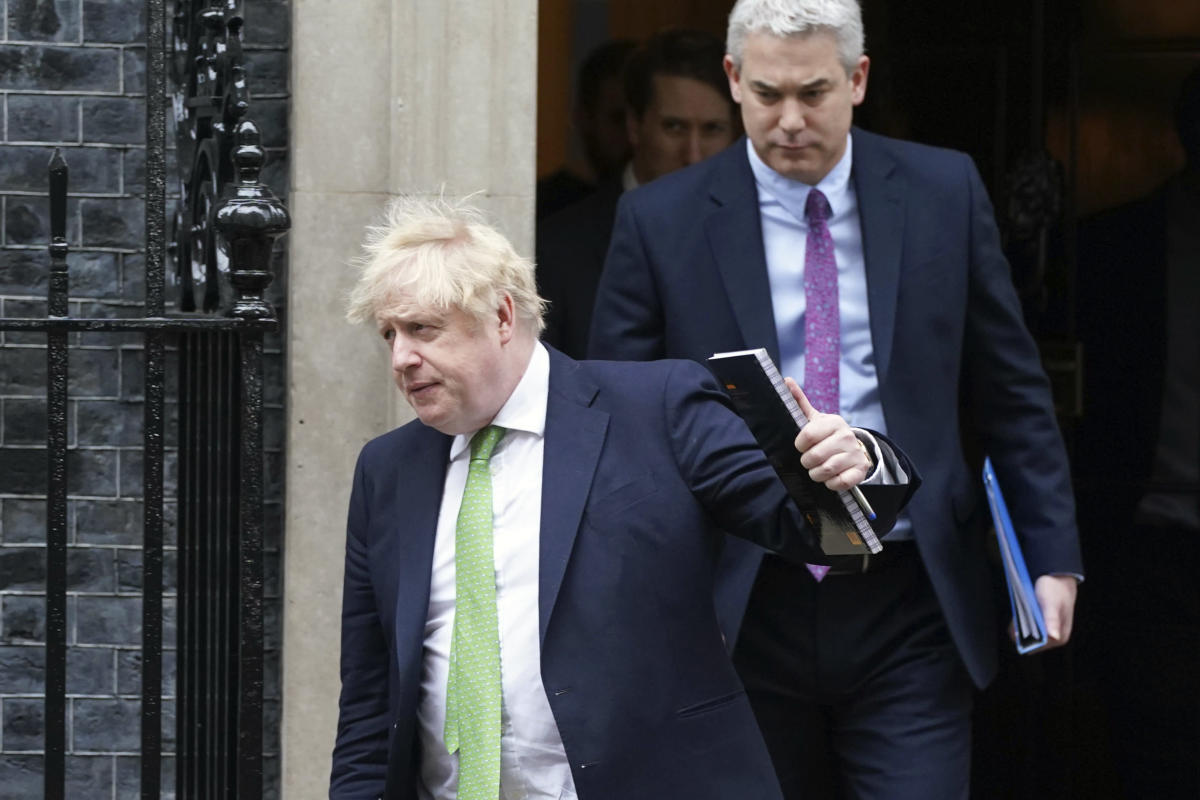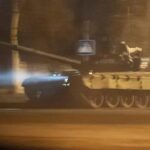
The Latest on the Russia-Ukraine crisis:
——
VIENNA — Austrian Chancellor Karl Nehammer says his country has summoned the Russian ambassador to protest Moscow’s breach of Ukraine’s sovereignty.
Nehammer said Austria supports the EU’s approach of imposing sanctions against Russia step by step, starting with a formal decision Tuesday afternoon by the bloc’s foreign ministers.
“There is a variety of sanctions options that now need to be used in a targeted way because we have to assume that we haven’t yet reached the peak of the escalation,” he told reporters in Vienna.
Nehammer also assured Austrians that even if Russia were to stop delivering natural gas immediately, “the energy supply is secure.”
Authorities in Vienna are also stepping up surveillance of potential cyberthreats to Austrian government institutions. The country’s foreign ministry was targeted in a cyberattack two years ago that was traced to Russia.
——
ANKARA, Turkey — Turkish President Recep Tayyip Erdogan says Russia’s decision to recognize two separatist regions in eastern Ukraine is “unacceptable” and is calling for a respect of international laws.
Speaking to Turkish journalists during a three-nation tour of Africa, Erdogan said the decision was a clear violation of Ukraine’s political unity, sovereignty and territorial integrity.
“We consider this decision by Russia as being unacceptable,” Erdogan said. “We reiterate our call to the parties to respect common sense and international law.”
His comments were reported by Hurriyet newspaper and other media.
——
BELVOIR CASTLE, England — U.K. Defense Secretary Ben Wallace has warned of worrying signs that Russia has begun to move forces into Ukraine as he opened a conference of defense ministers from Baltic and North Atlantic states.
Wallace issued the warning to a meeting of defense ministers from the nations of the Joint Expeditionary Force on Tuesday in Leicestershire, England, though he said reports of military equipment moving into Ukraine’s Donbas region would need to be verified.
“Many of us were forewarning that President Putin already had an agenda – you heard that agenda in his speech last night,’’ Wallace said, referring to Putin’s decision to recognize two breakaway regions in eastern Ukraine. “This is a sovereign state which has now had some of its land effectively annexed from it.”
——
SANAA, Yemen — Yemen’s Houthi rebels have welcomed Russia’s decision to recognize two separatist regions in southeast Ukraine.
Mohammed Ali al-Houthi, the head of the rebels’ Supreme Revolutionary Committees, said late Monday that the Iranian-backed Houthis support the recognition of Donetsk and Luhansk as independent republics. He called for restraint to avoid sliding into a war.
The Houthis have been in war against a Saudi-led coalition since 2015, months after the rebels overran Yemen’s capital, Sanaa, and ousted the internationally recognized government.
——
HELSINKI — The Baltic nations of Estonia, Latvia and Lithuania have strongly condemned Russia’s decision to recognize the separatist regions of Luhansk and Donetsk as independent states.
Estonian President Alar Karis said that “Russia tore the Minsk agreements into pieces,” referring to a 2015 peace deal. He said ”this shows that Moscow’s aim is to deepen the conflict, not to solve it.”
In Baltic neighbor Latvia, President Egils Levits, Prime Minister Krisjanis Karins and the country’s Parliament released a joint statement condemning Moscow’s actions.
The statement said that “in a gross violation of international law, under a fabricated pretext, and by spreading false information, Russia seeks to induce a change in Ukraine’s political leadership and foreign policy course by violent means.”
Lithuania Prime Minister Ingrida Simonyte tweeted that Russia President Vladimir “Putin just put Kafka & Orwell to shame: no limits to dictator’s imagination, no lows too low, no lies too blatant, no red lines too red to cross.”
She added: “What we witnessed (Monday evening) might seem surreal for democratic world. But the way we respond will define us for the generations to come.”
___
BRUSSELS — European Union foreign ministers will meet Tuesday to decide what sanctions to impose over Russia’s decision to recognize two separatist regions in southeast Ukraine, the EU’s top diplomat said.
EU foreign policy chief Josep Borrell said the meeting in Paris “will take the political decisions vis-à-vis the European response.”
“Clearly, that response will be in the form of sanctions,” Borrell said. He said the aim is not to impose the whole range of sanctions that the EU has prepared should Russian invade Ukraine, but rather to address the recognition of Donetsk and Luhansk as independent.
Asked whether Russia’s decision to send “peacekeepers” in already amounts to an invasion, Borrell said, “I wouldn’t say that’s a fully fledged invasion, but Russian troops are on Ukrainian soil.”
___
LONDON — Prime Minister Boris Johnson says the U.K. will introduce “immediate” economic sanctions against Russia, and warned that President Vladimir Putin is bent on “a full-scale invasion of Ukraine.”
Johnson said Putin had “completely torn up international law” and British sanctions would target not just the regions of Donetsk and Luhansk but “Russian economic interests as hard as we can.”
Johnson is to set out further details of the sanctions in the House of Commons later Tuesday.
He told broadcasters that this would be “just the first barrage of U.K. economic sanctions against Russia because we expect, I’m afraid, that there is more Russian irrational behavior to come.”
“I’m afraid all the evidence is that President Putin is indeed bent on a full-scale invasion of the Ukraine, the overrunning, the subjugation of an independent, sovereign European country and I think, let’s be absolutely clear, that would be absolutely catastrophic.”
___
PARIS — French Foreign Minister Jean-Yves Le Drian condemned in forceful terms on Tuesday the move by Russian President Vladimir Putin to recognize breakaway republics in Ukraine as a violation of international law and the Minsk peace agreement with Ukraine.
“Obviously, we will take the initiative to impose sanctions,” he said, adding that EU foreign ministers will meet “to examine together what measures to take.”
The 27-nation EU has said it would impose sanctions against Russia in case of an invasion of Ukraine.
___
BRUSSELS — A top European Union official says Russia’s recognition of the Ukrainian separatist regions of Luhansk and Donetsk as independent states and to send troops into the territories is an “act of war.”
Didier Reynders, the European Commissioner for Justice, said the 27-nation bloc is ready to implement sanctions against Russia.
Speaking to Belgian broadcaster RTBF, Reynders said a unanimous accord from EU member countries is needed for new sanctions to be imposed.
He said the anticipated measures would evolve gradually, depending on Russian actions. The first types would be travel bans against individuals and sanctions against economic entities via the seizing of assets in Europe and abroad.
In addition, Reynders said “it will be necessary to ensure that there are no more imports of goods or services from Russia, such as energy, and that Russia’s global access to financial services is terminated.”
“Everything is on the table,” he said, adding member states were discussing how gradual the moves would be and the possibility for diplomacy to ease the conflict.
___
COPENHAGEN, Denmark — Nordic leaders condemned Russia’s decision to recognize the Ukrainian separatist regions of Luhansk and Donetsk as independent states, saying Tuesday that Moscow had violated Ukraine’s sovereignty and territorial integrity. Swedish Foreign Minister Ann Linde called it “a blatant violation of international law.”
Denmark Foreign Minister Jepp Kofod called the Russian move “harmful” and said the Scandinavian nation urged Moscow to “stop its breach of international law.”
In Finland, President Sauli Niinisto said the country would respond in unison with the European Union, of which it is a member. Non-EU member Norway said the Russian decision “directly contradicts the spirit and the letter of the Minsk agreements.”
___
Follow AP’s coverage of the Ukraine crisis at https://apnews.com/hub/russia-ukraine




